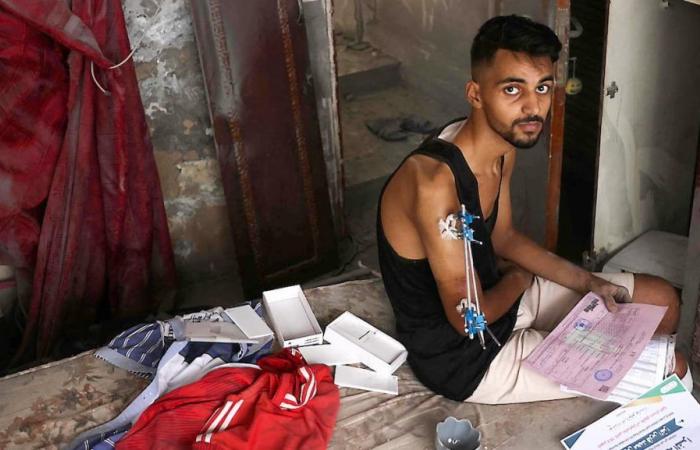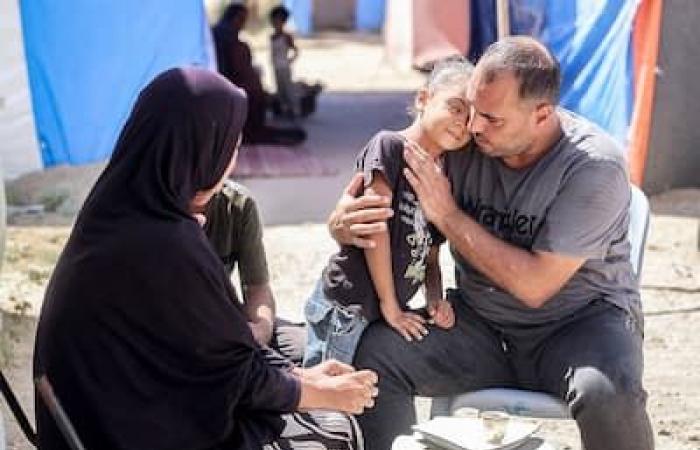PALESTINIAN TERRITORIES | Since the start of the war between Israel and Hamas on October 7 in the Gaza Strip, residents have lost everything. As the first anniversary approaches, AFP spoke to three of them who talk about how their lives have changed.
The student stopped in his tracks
Fares al-Farra, 19, was as brilliant at school as he was ambitious.
Two months before October 7, he graduated from high school and enrolled at the Gaza Higher School of Applied Sciences.
“I was always convinced that one day I would achieve my goals,” he remembers with nostalgia in the rubble of his house.
But with the war, his family, who were displaced from Khan Younes, their town in the south of the Gaza Strip, had to live for months in a camp before returning home after an evacuation order in Rafah, also in the south.
Then a bomb fell on his house, destroying the walls and killing his friend, Abu Hassan. He escaped with a broken arm.
All the hardships of the war took a toll on his optimism, he said.
“It feels like all the roads are closed […]basic needs will come before studies,” he says.
The student nevertheless hopes that the war will end, that the inhabitants of Gaza will stop suffering and that he will be able to “realize his dreams and goals in the university life” that he has planned.
The paramedic and her five children
Maha Wafi loves her job as an ambulance driver in Khan Younès.
She also loves life with Anis, her husband of twenty-four years, their five children and their beautiful house on the west side of the city.
Maha Wafi
Photo AFP
But after the start of the war, says this 43-year-old woman, the pressure “doubled” at work and family life became more difficult due to the removal of her family to a tent camp and the arrest of her husband. on December 2.
Since then, she has had to face the difficulties of war while working and caring for her five children alone.
“You live in a tent […]you have to bring water, get gasoline, light a fire and face all the difficulties,” she says, remembering the winter months before the war, when she took advantage of the good weather to spend time with your children.
“At the end of the day, it’s life in a camp,” she says.
“All of this represents mental pressure for a working woman,” adds M.me Wafi, sitting next to her ambulance.
Since October 7, she has seen “difficult scenes like body parts, injuries, martyrs.” She narrowly escaped death when a car was hit by a strike right next to her ambulance.
But most of all, she hopes that her husband, “a selfless person dedicated to helping others,” will be released.
The father started from scratch several times
Before the start of the war, Maher Zino, 39, worked as a civil servant. “With a decent salary, doing well,” he and his wife, Fatima, raised their three children in the northern Gaza City.
Maher Zino
Photo AFP
A year later, his family has been displaced “so many times it’s hard to count,” he told AFP from his shelter in an olive grove in central Gaza.
Moving from Gaza to Khan Younes, Rafah and back to central Gaza, the family had to start from scratch many times, “putting up a tent, building a bathroom, buying furniture and clothes,” says -he.
On several occasions, the family found themselves without resources and sleeping on the streets. Mr. Zino felt helpless, having “never needed anyone.”
“I became a beggar, I would reach out to people, I had to ask for blankets to cover my children, find charities that could give me a plate of food just so my children would have something to eat,” he says.
“This is what the war did to us,” he adds from his new shelter where, with his wife, they managed to create a semblance of family life, with a place to sleep, a water tank and outdoor toilets.
Like Maha Wafi, Mr. Zino hopes for only one thing: “to return to the situation before October 7.”







